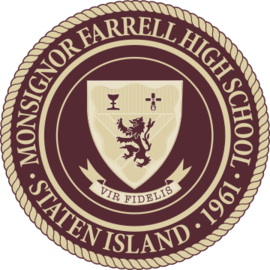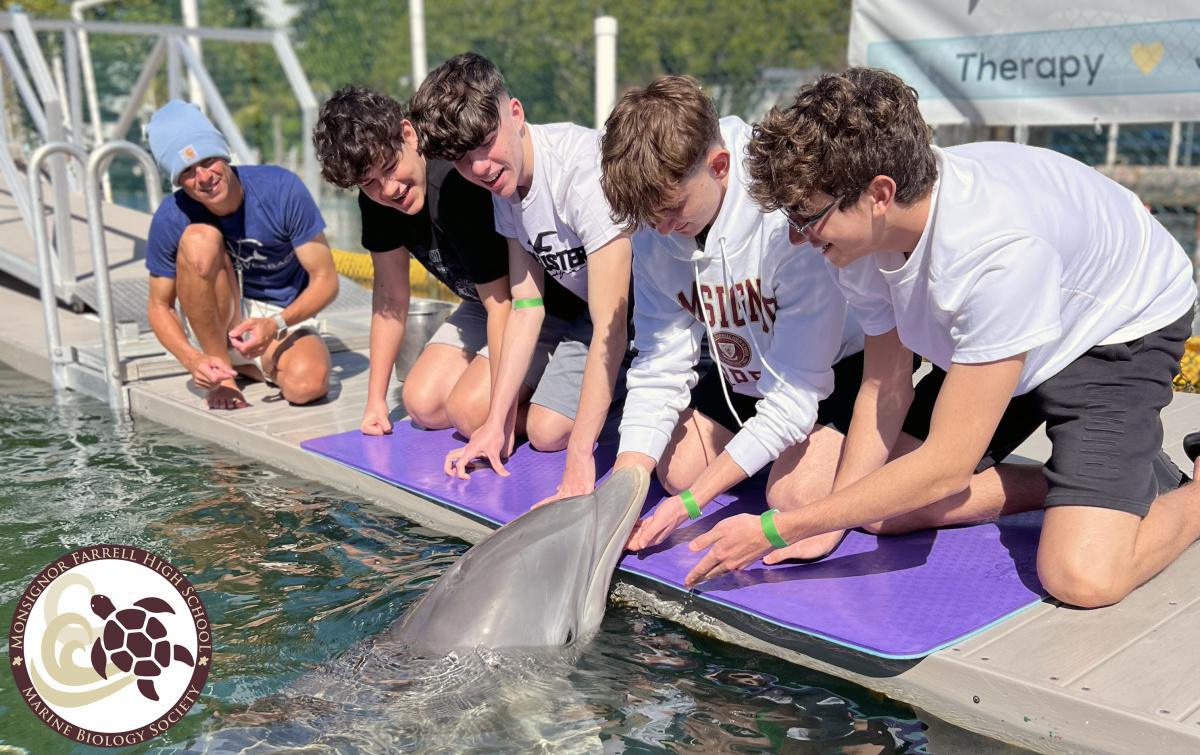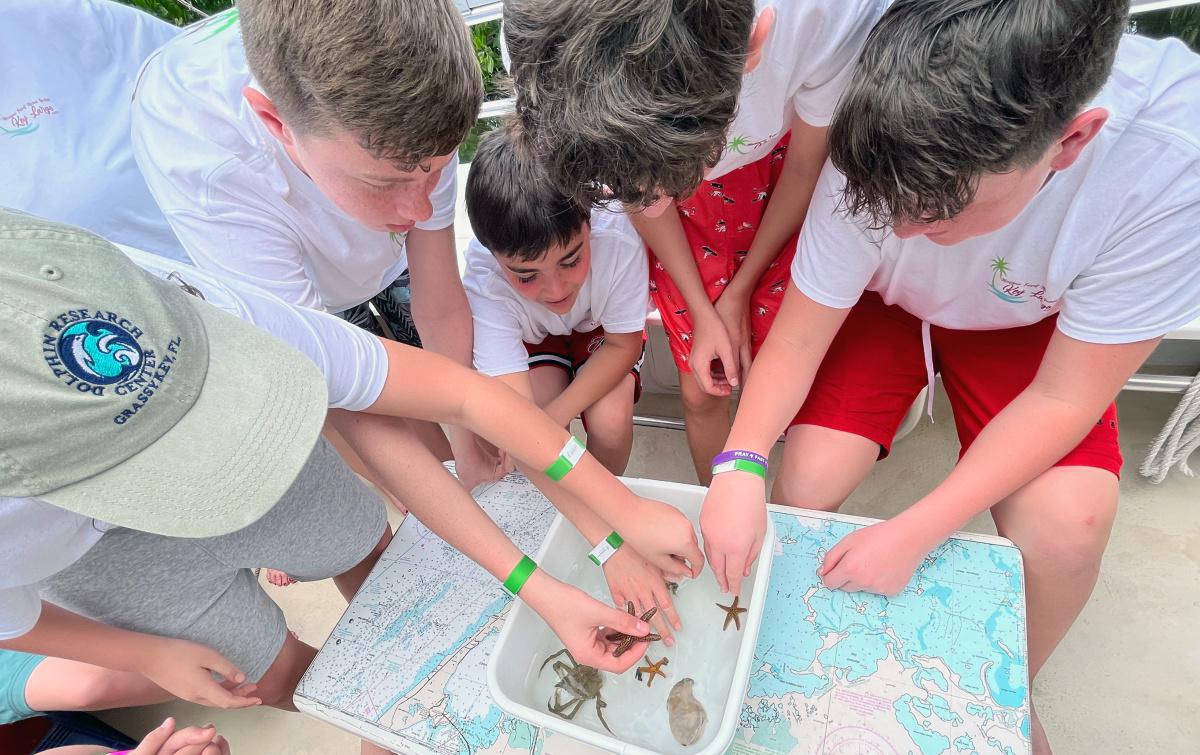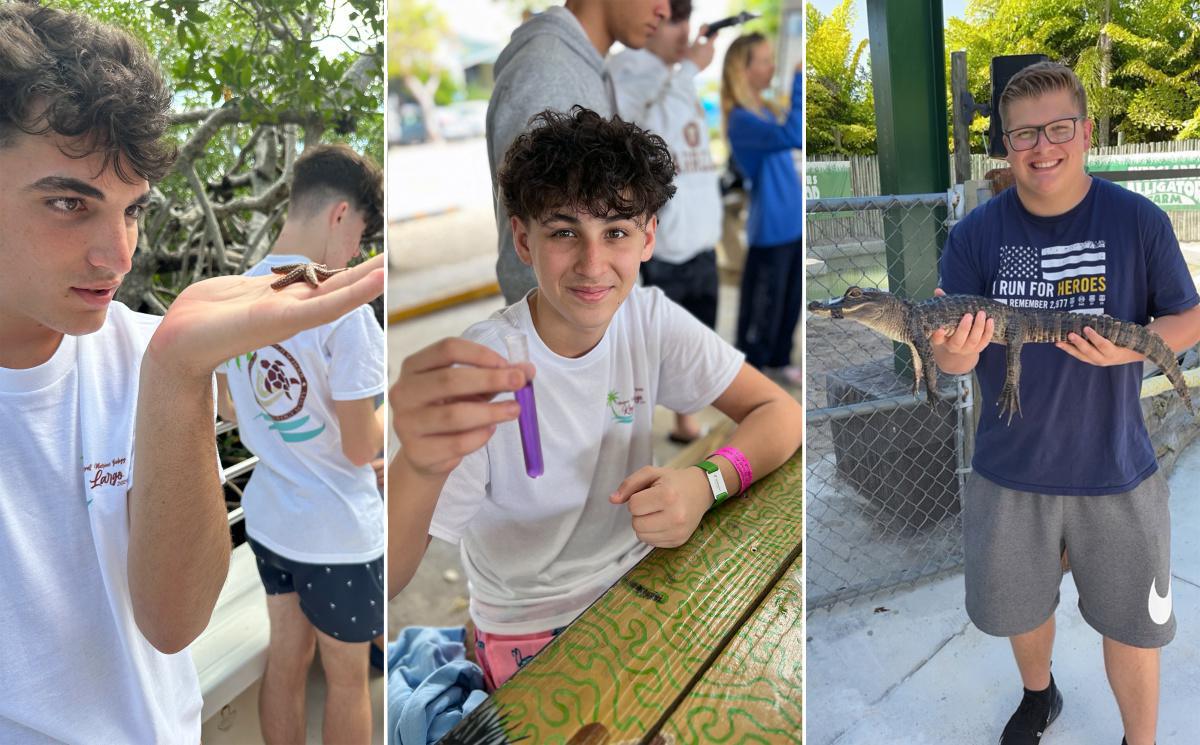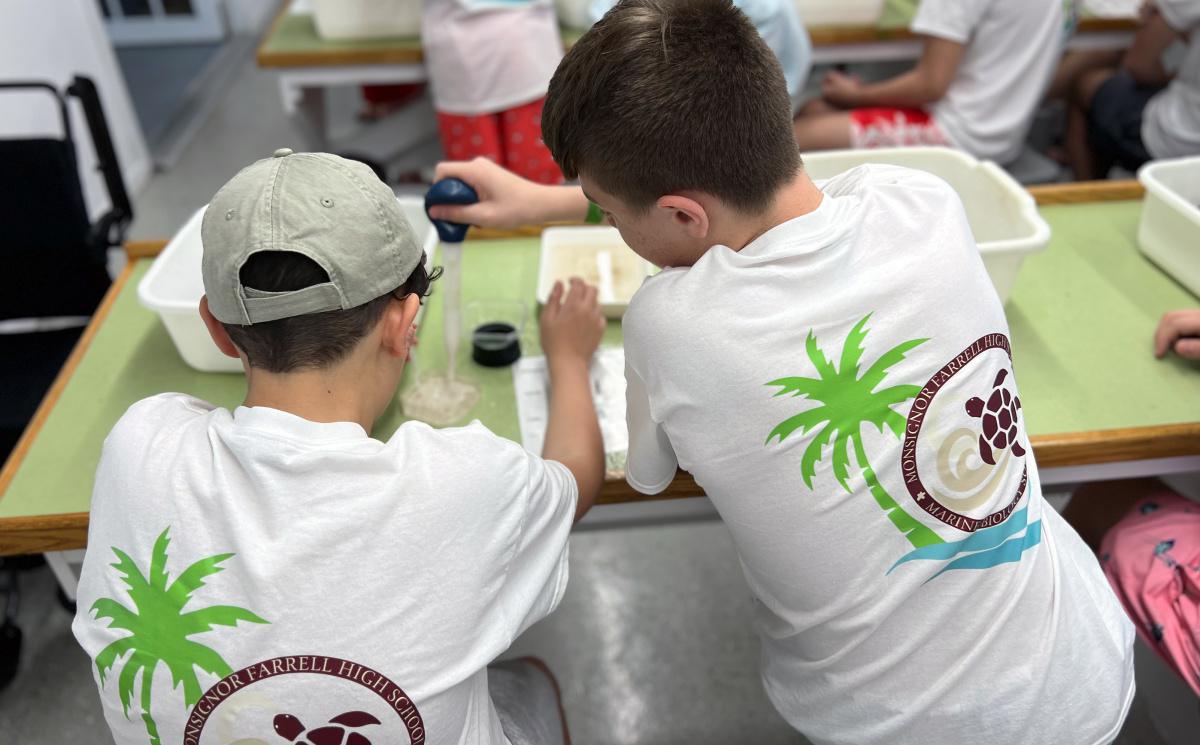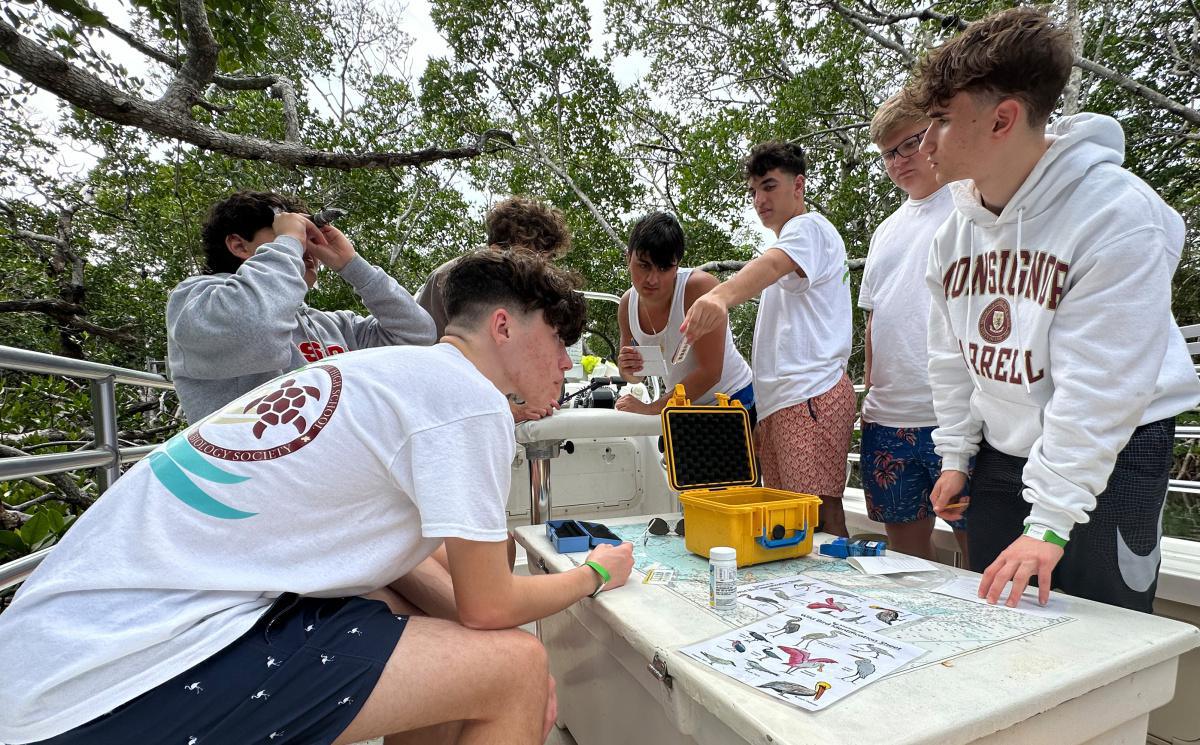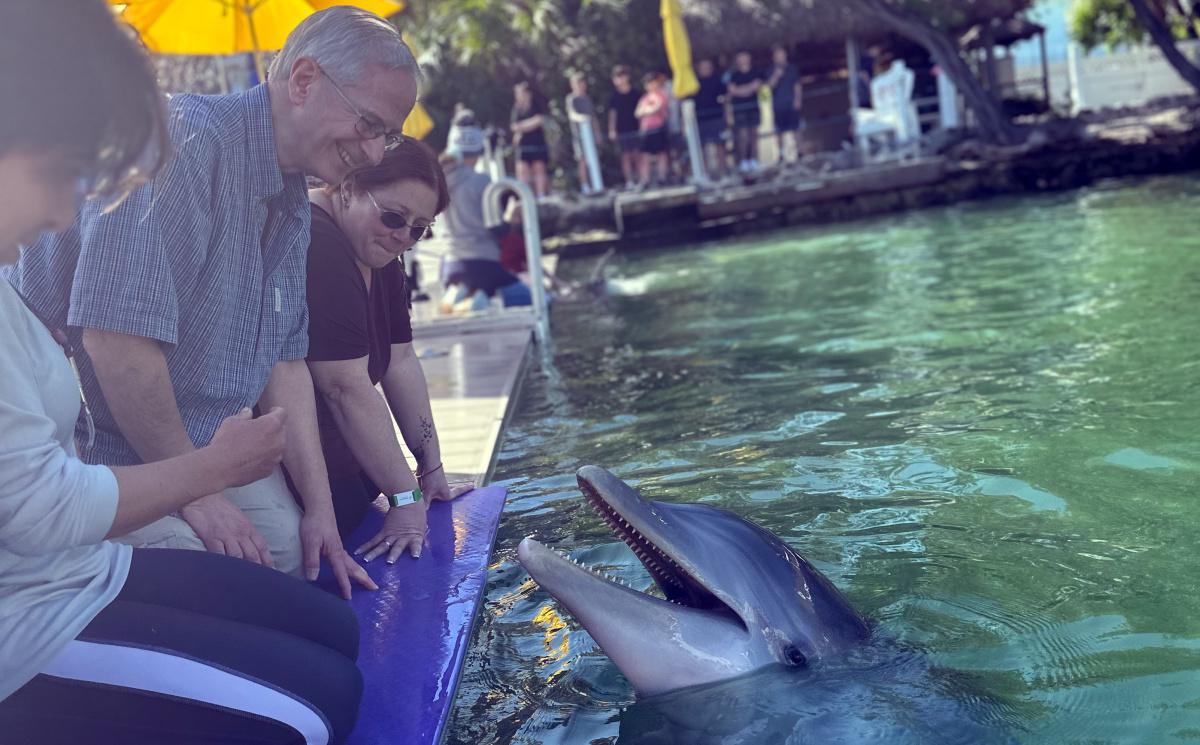A Groundbreaking Educational Journey
Sophomores Sebastian Sarmiento, Matt Carr, Joe Silvestro, and Christian Vann study dolphin behavior at Island Dolphin Care in Key Largo, Florida.
A Groundbreaking Educational Journey
Students from our Marine Biology Society touched down in Miami, Florida on February 21st en route to Key Largo to begin the school’s first-ever research trip to the Florida Keys.
“It was the trip of a lifetime! Honestly, the best trip I’ve ever gone on,"
- Zachary Claro '27
Guiding the young researchers were school president Mr. Lou Tobacco '90, Mrs. Jennifer Frydberg, the Chair of the Monsignor Farrell Department of Science, and the Director of the Marine Biology Society, as well as members of the school’s leadership team and faculty. Also joining the Lions was former Richmond County Deputy Borough President Mr. Ed Burke, who most recently served as senior advisor to Borough President Vito Fossella '83 before retiring from local politics. Mr. Burke now serves as the Chief of Staff at the Staten Island Zoo. “Ed is a major supporter of our Marine Biology Society and has been instrumental in helping us with local conservation efforts,” noted Mr. Tobacco.
“I was proud to take a deep dive into environmental fieldwork with the Monsignor Farrell High School Marine Biology Society,” Mr. Burke said. “From the classroom to the coral reef, the Farrell students were amazing and had an incredible learning adventure. I’m so thankful to Lou (Tobacco) for inviting me to join them,” he added.
Matt Peckerman '26, Luke Tobacco '27, Tyler Cohen '27, and Dalton Lake '27 examine marine life aboard the MarineLab Maubi II research vessel in Largo Sound, Florida.
The faculty and students on the trip described it as one of the best experiences of their lives. Parents of students on the trip also praised the school for the unique opportunity, including Dayna Scarso, whose son Pietro is a freshman. “I am confident that Pietro has chosen the absolute best high school for him and at Farrell he will continue to grow and thrive surrounded by genuinely amazing people,” she said.
The Idea Behind the Trip
Although our marine biology students have taken full advantage of the abundant marine life available to study in and around New York Harbor, the marine ecosystem they maintain in our biology lab, and the research they perform in their own water testing facility, the school’s leadership wanted to provide the students with a hands-on research opportunity that would allow them to experience the diversity of marine organisms from other locations. What better location than the Florida Keys?
“Part of the reason we chose Monsignor Farrell was because of the incredible opportunities like the Key Largo trip that they offer to their students.”
- Dayna Scarso P '27
“Our commitment to hands-on learning and expanding our students’ horizons led us to explore marine life beyond the familiar waters of New York Harbor,” Mr. Tobacco explained, describing the trip as a “groundbreaking educational journey.” “We’re not just teaching marine biology, he noted, “we’re fostering the next generation of environmental stewards and global citizens.”
“We decided to set up this amazing opportunity for our students to visit Key Largo so they could learn about dolphins, sea turtles, and other marine life in person,” said Mrs. Frydberg. “In my 22 years as an educator, this experience was certainly one of the most memorable,” she added. “It was simply amazing to see our students so excited to learn about marine life.” Mr. Tobacco agreed with the assessment. “The trip was not only a highlight of my tenure as President of Monsignor Farrell High School, but also a profound reminder of the transformative power of immersive learning,” he explained. “It’s moments like these that underscore the importance of expanding our educational boundaries and the lasting impact it has on our students’ understanding of the world.”
An Educational Experience Like No Other
Dolphins
The first excursion of the trip was to Island Dolphin Care in Key Largo. The facility provides motivational and educational dolphin-assisted programs for children and adults with special needs and abilities.
Our students were greeted by Kristen Szpak, the Director of Marine Science Education and Research at Island Dolphin Care. The students then engaged in hands-on learning that included the dissection of a squid as well as visiting a “touch tank” where they learned about sea urchins, crabs, sea stars, and shrimp. “The most memorable portion of the program was the dolphin encounter,” Mrs. Frydberg explained. “We were able to sit on the dock and interact with the dolphins as we were learning about them,” said senior Matthew Armento. “It was my favorite part of the trip,” he admitted. Matthew and his classmates were also taught how dolphins are trained to obey the commands of their trainers. “I found it amazing the way dolphins are able to interact with humans and respond to our commands.” Sophomore Julian Cassabria also found the dolphin experience to be the highlight of the trip. “They were very well trained and they did flips with our hand movements. I found that very cool!” he said.
Matthew King '24 inspects a starfish aboard the MarineLab Maubi II research vessel; Derek Spitalieri '26 conducts a water quality experiment at MarineLab Research Center; Nick Notaro '24 at the Everglades Alligator Farm.
The students had another opportunity to study dolphins later in the trip during their visit to the Dolphin Research Center in Grassy Key, Florida. The center provides sanctuary and rehabilitation to dolphins, sea lions, and other marine life from the surrounding area.
Glass-Bottom Boat and Coral Reef
On day two of the trip, the members of the Marine Biology Society boarded the Key Largo Princess for a two-hour glass bottom boat tour, which included the Molasses Reef Sanctuary Preservation Area, part of the John Pennekamp Coral Reef State Park. Students were treated to exhilarating views of the reef and its inhabitants, including sharks, stingrays, parrot fish, and sea turtles.
The Turtle Hospital
The next stop on the research trip was The Turtle Hospital, located two hours south in Marathon, Florida. Since 1986, The Turtle Hospital has rehabilitated injured sea turtles and released them back to their natural habitat, worked toward environmental legislation making the beaches and water safe for sea turtles, and provided education to the public.
During the guided tour of the hospital, the students learned about and met the rescued sea turtles being rehabilitated at the facility, even “adopting” one. “The cost of the ‘adoption’ will help fund the turtle’s care for one year,” explained freshman Tyler Cohen.
Sophomores Matt Peckerman and Mike Brusco, sporting their Key Largo trip shirts, search for microorganisms in water samples from the Florida Keys.
MarineLab Environmental Research Center
The students also traveled to the MarineLab Research Center in Key Largo where they collected rock specimens. They examined different types of algae and learned how to find and identify microscopic creatures living among the seaweed and rocks. Students then learned about different water quality testing parameters and were then able to use those newly learned skills aboard research boats in the Largo Sound. Then students explored the mangroves around John Pennekamp Coral Reef State Park and learned about marine organisms including sea slugs, sea stars, spider crabs, and sea snails that they caught while on the boats.
Pythons, Lizards, and Gators - Oh My!
On the final day of the trip, the group headed to the Everglades Alligator Farm where they learned about various species of snakes, parrots, lizards, emus, tortoises, and of course, alligators.
After exploring the facility on foot, the group took to the swamp aboard airboats on an adventure through the Everglades where they encountered green iguanas and alligators in the waters alongside them.
Water quality testing in the mangroves aboard the MarineLab Maubi II research vessel; Matt Carr '26, Sebastian Sarmiento '26, Christian Vann '26, Charles Polizzotto '24, Matt King '24, Nick Notaro '24, and Joe Silvestro '26.
Fun in the Sun
In between research excursions, the group got to enjoy some downtime at beautiful Cannon Beach. Students swam, snorkeled, and soaked up the Florida sun. “The success of the trip has set a new standard for educational excellence at Monsignor Farrell,” Mr. Tobacco noted. “We are eagerly looking ahead to our next adventure.” As it turns out, the next adventure(s) for our students aren’t too far away. Students and faculty will be departing for our annual World History Tour to Europe. “We land in Paris on March 25th!” said Mr. Tobacco. Students will also be taking part in a school trip to Boston in April.
“Affording our Faithful Men the opportunity to travel is part of our dedication to providing exceptional educational experiences at Monsignor Farrell."
- Mr. Tobacco
About the Marine Biology Society at Monsignor Farrell
The Marine Biology Society, one of our numerous specialized academic societies established during Mr. Tobacco’s tenure as school president, was formed during the 2020-2021 school year.
During its first year, the 25 founding students along with Mrs. Frydberg, the director of the society, began their introduction to marine biology by establishing and maintaining 400-gallon saltwater and 400-gallon freshwater ecosystems housed in our newly refurbished biology lab. The society also began a relationship with the Billion Oyster Project by becoming involved in various research projects and volunteering at various beach cleanups.
Initiated by students in the society, Monsignor Farrell acquired a grant to purchase equipment and supplies needed to establish our own water quality testing facility. Then-freshmen Vincent D’Ovidio, Aidan Lihari, Brian Lihari, and Joseph Sparacio began a 20-week water quality study in conjunction with the Citizens Water Quality Testing Program (CWQT) which runs from May through October each year. Now seniors, those students presented their research from the past two years at the Billion Oyster Project Research Symposium on Governor’s Island and were twice awarded the Exemplary Project Certificate for their work.
Ed Burke, Chief of Staff at the Staten Island Zoo, and Mrs. Frydberg, Monsignor Farrell’s Department of Science Chairperson and Director of the Marine Biology Society, at Island Dolphin Care in Key Largo, Florida.
Now in its fourth year, the Marine Biology Society has grown to include 259 students who participate in various activities including beach cleanups organized by NYC H2O, guest lectures with professionals from different sectors in the Marine Biology world, oyster research with the Billion Oyster Project, whale and dolphin watching trips, various local field trips, virtual lab events with Engineering Tomorrow, and water quality testing studies in conjunction with the CWQT program.
Monsignor Farrell also offers a Marine Biology elective to seniors, which is taught by Mrs. Frydberg.
